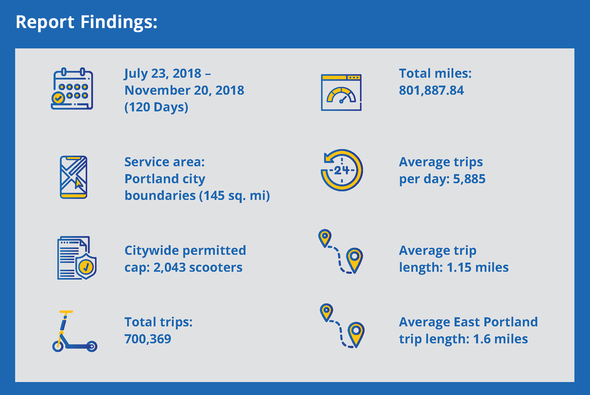The Portland Bureau of Transportation says last summer’s Shared Electric Scooter Pilot Program was such a success they plan to bring them back for a one-year pilot program this spring.
Here’s the announcement:
The Portland Bureau of Transportation today released the 2018 E-Scooter Findings Report. Drawing on scooter use data, public opinion polling, staff observations and other sources, the report evaluates Portland’s first e-scooter pilot conducted from July 23 to Nov. 30, 2018. Based on this evaluation, the bureau also announced a one-year pilot program that will bring e-scooters back to Portland streets this spring.
“I’m glad that PBOT took a proactive approach, requiring e-scooter companies to share their data and to serve East Portland,” said Transportation Commissioner Chloe Eudaly. “While this technology has the potential to reduce congestion and pollution, I remain concerned about the unlawful use of e-scooters on sidewalks and in City parks, and the impact of e-scooters on people with mobility challenges or vision impairment. We will continue to seek public input on how to best serve all Portlanders.”
New data gathered by Multnomah County Health Department for PBOT show e-scooters were subject to risks similar to other ways of getting around. Scooter-related injuries (including injuries from non-motorized scooters) were a small portion of total traffic crash injuries, accounting for about 5 percent of the estimated 3,220 of total traffic crash injury visits to emergency rooms and urgent care centers during the pilot period. Scooters generated 176 visits or less than half the 429 visits for bicycle-related injuries.
“We recognize people are interested in understanding the risk associated with a citywide scooter ride-share program, and this analysis provides an important baseline from which to make that determination,” said Environmental Health Director Jae Douglas, Ph.D. “After reviewing emergency department and urgent care clinic data, we found that e-scooters have risks similar to other parts of the transportation system. We did not find a disproportionate risk that would discourage the city from allowing a scooter ride-share pilot.”
A start date for the second pilot program has not been set. PBOT staff will brief community groups and transportation advisory committees on the findings report and seek input on how the bureau should conduct the second pilot program. A longer one-year pilot program will give PBOT the chance to test new measures to improve the use of e-scooters.
The bureau will also seek input through an on-line open house, which is set to begin in the coming days. The open house will give Portlanders the chance to submit their ideas about how the bureau can address some of the significant challenges related to scooter use, including sidewalk riding, improper parking and securing access to this new technology for all Portlanders. People wishing to be notified of the online open house, should sign up for email updates at the Shared E-Scooter Pilot Program website.
Here are the positive findings of the report:
A majority of Portlanders viewed e-scooters positively.
In a representative citywide poll conducted in December by DHM Research, 62 percent of all Portlanders viewed e-scooters positively at the end of the pilot. Support was even higher among Portlanders under 35 (71 percent), people of color (74 percent), and those with incomes below $30,000 (66 percent).Scooter safety risks were similar to other ways of getting around.
According to the Multnomah County Health Department, scooter related injuries increased from less than one per week before the pilot to about 10 per week during the pilot. Weekly emergency room visits peaked in late August and early September before decreasing to near pre-pilot levels by the end of the pilot in November.Portlanders primarily used e-scooters for transportation.
71 percent of Portlanders reported that they most frequently used e-scooters to get to a destination, while only a third of respondents (28.6 percent) said they most frequently used e-scooters for recreation or exercise.E-scooters replaced driving and ride-hailing trips.
34 percent of Portland riders and 48 percent of visitors took an e-scooter instead of driving a personal car or using Uber, Lyft, or a taxi.Having safe scooter infrastructure mattered to riders.
Based on scooter ride data, riders preferred riding on low-traffic streets such as Neighborhood Greenways and on streets with bike lanes. This was also confirmed by rider survey data.
It wasn’t all roses and unicorns. Here are some of the findings that illustrate how, “e-scooter use created conflict with pedestrians and underperformed on some City goals”:
Portlanders reported widespread illegal sidewalk riding and incorrect scooter parking.
With speeds capped at 15 mph, scooters are appropriate for bike lanes or low-volume streets, but they are too fast for use on sidewalks, where they make it unsafe or uncomfortable for people walking or using mobility devices. And while staff observations showed most scooters parked properly in the sidewalk furnishing zone, improperly parked scooters negatively impacted accessibility and created a hazard for people with visual impairments.E-scooter use in parks impacted other users and presented a significant management challenge for Portland Parks & Recreation staff.
Although bicycles are allowed in Portland parks, including Waterfront Park and the Eastbank Esplanade, motorized vehicles are not. E-scooter use on Portland parks trails violated Portland Parks & Recreation’s rules, but most riders (66 percent) said they weren’t aware of the rules.E-scooter companies did not consistently comply with the East Portland fleet requirement and the pilot program showed other equity challenges.
Companies did not consistently comply with the East Portland fleet requirement. Companies only enrolled 43 Portlanders in a low-income plan. Along with staff observations, this suggests low company performance in aligning business practices with City equity goals.
They’ve also released this cool interactive map of all the routes taken by scooter users:
You can learn more and download the report here – www.portlandoregon.gov/transportation/e-scooter.
— Jonathan Maus: (503) 706-8804, @jonathan_maus on Twitter and jonathan@bikeportland.org
Never miss a story. Sign-up for the daily BP Headlines email.
BikePortland needs your support.
The post Portland releases final report on e-scooters, plans to bring them back in spring appeared first on BikePortland.org.
from BikePortland.org http://bit.ly/2MaBp9m




No comments:
Post a Comment